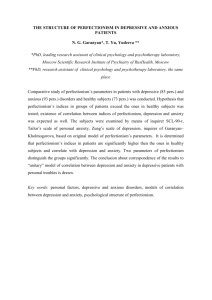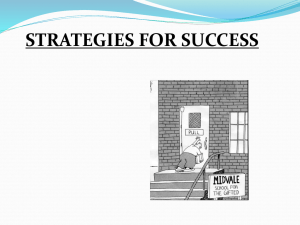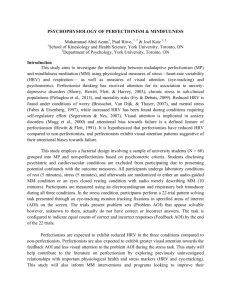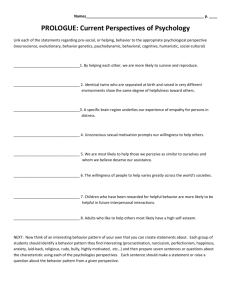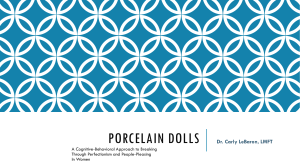argument paper - I will I can I must
advertisement
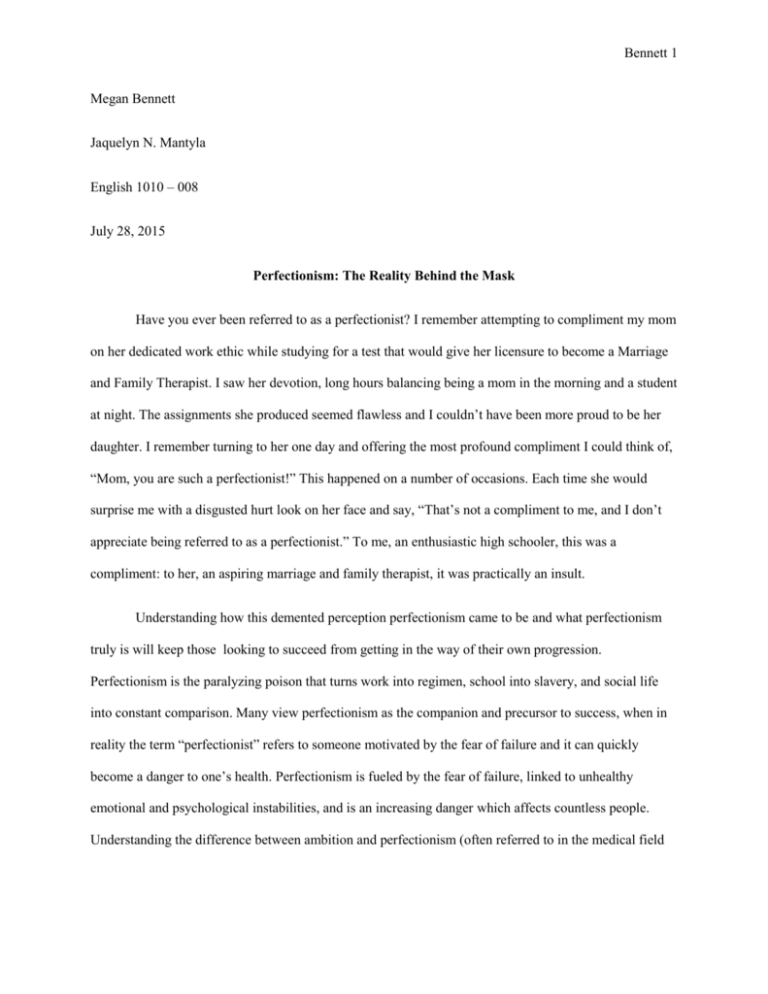
Bennett 1 Megan Bennett Jaquelyn N. Mantyla English 1010 – 008 July 28, 2015 Perfectionism: The Reality Behind the Mask Have you ever been referred to as a perfectionist? I remember attempting to compliment my mom on her dedicated work ethic while studying for a test that would give her licensure to become a Marriage and Family Therapist. I saw her devotion, long hours balancing being a mom in the morning and a student at night. The assignments she produced seemed flawless and I couldn’t have been more proud to be her daughter. I remember turning to her one day and offering the most profound compliment I could think of, “Mom, you are such a perfectionist!” This happened on a number of occasions. Each time she would surprise me with a disgusted hurt look on her face and say, “That’s not a compliment to me, and I don’t appreciate being referred to as a perfectionist.” To me, an enthusiastic high schooler, this was a compliment: to her, an aspiring marriage and family therapist, it was practically an insult. Understanding how this demented perception perfectionism came to be and what perfectionism truly is will keep those looking to succeed from getting in the way of their own progression. Perfectionism is the paralyzing poison that turns work into regimen, school into slavery, and social life into constant comparison. Many view perfectionism as the companion and precursor to success, when in reality the term “perfectionist” refers to someone motivated by the fear of failure and it can quickly become a danger to one’s health. Perfectionism is fueled by the fear of failure, linked to unhealthy emotional and psychological instabilities, and is an increasing danger which affects countless people. Understanding the difference between ambition and perfectionism (often referred to in the medical field Bennett 2 as adaptive perfectionism versus maladaptive perfectionism) will promote increased overall health and productivity to those hoping to excel in all aspects of life, from work to recreation. In order to avoid the negative effects of perfectionism, we must first learn what it is, why it is so prevalent, and what causes it. Michael Brunstein, Psyd, a Doctor of Psychology with his own private practice in New York City and New Jersey, defines in his book, “Perfectionism a Guide for Mental Health Professionals,” the defines “self-oriented” perfectionism as “setting incredibly high personal standards” (Brunstein 4). He then goes on to further explain; “the standards set by perfectionists are … unrealistic. Their goals are not just to excel but to be perfect and to avoid failing at any cost” (Brunstein 4). We can see here that perfectionists are not simply motivated to do well, they are shooting to be “perfect” and to “avoid failing at any cost.” Everyone wants to succeed, however, these desires get out of hand when they are based upon unrealistic expectations that cannot be met. Brunstein illustrates this point by giving an example of an athlete in a wrestling match: “For example … a self-oriented perfectionist who performed perfectly in a wrestling match, still feels dejected. The athlete, despite achieving his initial goal, may continue to be dissatisfied because he felt that he had to prepare more than appropriate or more than the ideal amount of time” (Brunstein 4). In this example we see how perfectionism is not about simply winning, it is the underlying drive to constantly perform above and beyond what is achievable. It is never satisfied. Motivated by fear of failure, it leads the bearer to feel they are never enough. You may be thinking, “but if I were to just settle, I would never push myself and I could not improve!” I agree; however, it is important to understand that “pushing yourself” is good as long as it is within the bounds of reality. Remember, standards of a perfectionist are unrealistic: they are unattainable and constantly out of reach. A major cause of perfectionistic thoughts lies in setting unattainable goals that can actually become destructive because the bearer will never be enough. On the same note, it has been observed that perfectionism can actually be counter-productive. Gordon L. Flett, Ph.D, an assistant professor in the Department of Psychology at York University, Paul L. Hewitt, Ph.D, a clinical psychologist and an assistant professor in the Department of Psychiatry at the Bennett 3 University of Ottawa, Kirk R. Blankstein, Ph.D, an associate professor in the Department of Psychology, and Spomenka Koledin, a graduate student from York University, state in their research, “Components of Perfectionism And Procrastination in College Students,” in the “Journal of Rational-Emotive CognitiveBehavioral Therapy.” Their research brings to light important aspects of perfectionism in college students. In their studies they found a strong correlation between perfectionism and “academic procrastination”(qtd. in Flett 91). The perfectionistic desires for great achievement are revealed to have little to do with effective planning or goal setting. These unrealistic desires turn into looming, impossible tasks that are put off and procrastinated because of the impossibility of it all. Then, when it comes down to crunch time, students are left overly stressed and incapable of achieving what they had anticipated being able to accomplish. The link between perfectionism and procrastination is proof that perfectionism is lead by unrealistic goals and fears and produces a lower result than if tasks or assignments were planned and guided by realistic goal setting. These unrealistic goals and fears are often linked to emotional or mental illness. There are many disorders associated with perfectionism. As a therapist, Michael Brunstein noticed that a high amount of his patents demonstrated perfectionistic tendencies by having, “extremely high standards for themselves and others” (Brunstein 4) He then mentions how he began to realize that the “trait of perfectionism” is widespread among “clinical populations because it predisposes individuals to numerous psychopathologies ranging from anxiety, depression, and personality disorders” (Brunstein vii) In other words, where there is perfectionism, there is likely another form of emotional/mental illness attached. I remember discovering this for my self after spending some time away from home in a foreign country. We were not under parental supervision, and I put it on myself to be the mom of our apartment. I remembered how my mom seemed to be perfect, she always knew what to do and she never let important things fall through the cracks. I remember feeling this pressure build and realized I had a problem when I found myself ritually getting up three consecutive times each night just to make sure the door was locked before allowing myself to go to bed. I remember feeling trapped, like I would never know enough to be Bennett 4 successful or keep everyone safe, along with constantly feeling sick and exhausted from the full work load, I began spiraling into immobilizing depression. My constant need to perform at one hundred percent, one hundred percent of the time kept me from pacing myself and led me to believe if I could not do things perfectly I was incapable of doing them altogether. This struggle with perfectionism, like Brunstein mentioned, went hand in hand with my depression and anxiety. Parenting styles can greatly influence perfectionistic tendencies. Students especially, can feel pressured by their parent’s expectation for them to succeed. Xiaopeng Gong, a member of the division of teacher education at West Oregon University, along with Kathryn L. Fletcher, and Jocelyn H. Bolin – members of the Department of Educational Psychology at Ball State University – published a study, in July 2015, in the “Journal of Counseling and Development,” entitled, “Dimensions Of Perfectionism Mediate The Relationship Between Parenting Styles And Coping." This study suggests that stricter parenting styles can heighten perfectionistic tendencies in their children. The article illuminates this connection by stating, “Authoritarian parenting … was positively associated with … perfectionism … .In line with the Social Reaction Model, children raised by parents who were rigid and controlling were more likely to develop perfectionism” (Gong 265). Ironically, despite parents’ best efforts to authoritatively guide them, the children develop perfectionism and become at risk for developing dangerous coping strategies, which can easily lead to the emotional and psychological disorders mentioned earlier. I remember watching many classmates cringe after getting handed back a less than exceptional test score: “my parents are going to kill me!” they would worry. This fear of failure is not derived out of a desire to learn and succeed; it’s a result of unrealistic expectations from parents projected onto their children. Specifically referring to college students, this study advises counselors to pay special attention to “students who are overly concerned about making mistakes, as well as those who are doubtful about whether to take action [because they] tend to cope with stress by avoiding or denying the stressors and are at higher risk for using alcohol and drugs to get away from stressful situations” (Gong 265). While many view perfectionists as people only striving to do their best, this study shows how perfectionism can Bennett 5 actually become a barrier to that success they crave. We can conclude that “authoritative” parents who hold their children to impractical expectations are setting them at higher risk for inadequate and dangerous coping strategies which can in turn lead to depression, anxiety, and other personality disorders. There are many successful figures in American society who find themselves struggling under the influence of perfectionism and its corresponding psychological disorders. Take Steve Jobs for example – famous for his Apple products and his role in the computer revolution of the 1970’s, Steve jobs has become a legendary model of success. Walter Isaacson, Jobs’ biographer, hints at his perfectionistic qualities in the opening pages of his biography, “[his] passion for perfection and ferocious drive revolutionized six industries: personal computers, animated movies, music, phones, tablet computing, and digital publishing” (Isaacson, 2011, p. xx–xxi). While it is true that Jobs’ perfectionism played a key role in his success, it often pushed his co-workers to their limits – once he had a vision he would work at all costs to make sure the product came out “perfect”: In 1985, he drove his hardware team crazy in order to make a computer that was a sleek, gorgeous magnesium cube. After his return to Apple, in 1997, he got personally involved with things like how many screws there were in a laptop case. It took six months until he was happy with the way that scroll bars in OS X worked. Jobs believed that, for an object to resonate with consumers, every piece of it had to be right, even the ones you couldn’t see. (Brunstein 6) While his perfectionism pushed him to create high quality, groundbreaking products, we can see that he simply could not settle for anything less than what he perceived to be imperfect. He was so set on making the perfect product that he would “get personally involved” with minute details like the number of “screws in a laptop case”. Job’s friend and co-worker, Daniel Kotte “reported that jobs ‘could not achieve inner calm’” (Brunstein 6). This lack of “inner calm” was not Bennett 6 confined to his career. Even when admitted to the hospital for treatments on his pancreatic cancer his sister noted that “he went through 67 nurses before he found 3 whom he liked” (Brunstein 6). Brunstein later comments on Steve’s “lack of inner peace” stating, “research illustrates [the lack of inner peace] is associated with negative aspects of perfectionism” (Brunstein 6). Through Steve jobs and other celebrities we see that while perfectionistic traits may lead to high quality work there are negative side effects that are often overlooked by the common public. Another example of hard working professionals who struggled with perfectionism are Katty Kay and Claire Shipman. Jennifer Bennett, a columnist for Time.com and a contributing editor for Sheryl Sandberg’s women’s foundation, commented on a dinner conversation between these longtime friends. She explains how both Kay and Shipman “realized over dinner one night that each struggled with … self-doubt.” Shipman, upon being asked how she got into Journalism “had a habit of telling people she’d gotten ‘lucky.’” Then Bennett contrasts this by explaining their successes, “Kay, a news anchor for the BBC, has covered three presidential elections, the wars in Kosovo, Afghanistan and Iraq, and speaks several languages. And yet she spent her career convinced her she wasn’t smart enough to compete for the top jobs … [Claire Shipman] began her career as a foreign correspondent at CNN, reporting from Moscow.” (Bennett para.5) While both Kay and Shipman’s lives embody success, yet through out their careers they both expressed feelings of self-doubt. So wait a minute, didn’t we just establish that perfectionists expect more than they are capable of performing, not less? In truth, perfectionism can also manifest itself by feelings of inferiority—think about it, if you are constantly expecting more of Bennett 7 yourself than you are able to perform, you are constantly proving to yourself that you cannot do what you feel you should be capable of. These feelings of inferiority are just as much a lie as the unrealistic expectations. A perfectionist rarely finds personal satisfaction – always pushing forward and never quite feeling like they’ve have arrived. Kay and Shipman are just a few of many examples of strong, successful women who struggle to feel satisfied with their work because their focus was on what they were incapable of doing. So many people, all around you, are struggling with perfectionism. While we know it is important to push ourselves and to find success, it is equally important not to fall into destructive perfectionistic thinking. Understanding what perfectionism truly is, its unhealthy psychological and emotional ramifications, and its popularity among many successful icons, can help us to watch for those signs in our own lives. In doing this we will develop a healthier lifestyle, and a more productive work ethic. Perfectionism, ironically, with holds us from the very perfection being we are looking for. Bennett 8 Works Cited Bennett, J. (2014, April 22). It's Not You, It's Science: How Perfectionism Holds Women Back. Retrieved July 16, 2015. Brustein, Michael. Perfectionism: A Guide For Mental Health Professionals. New York, NY: Springer Publishing Company, 2013. eBook Collection (EBSCOhost). Web. 23 July 2015. Flett, Gordon L., Kirk R. Blankstein, Paul L. Hewitt, and Spomenka Koledin. "Components Of Perfectionism And Procrastination In College Students." Social Behavior and Personality: An International Journal Soc Behav Pers (1992): 85-94. Print. Gong, Xiaopeng, Kathryn L. Fletcher, and Jocelyn H. Bolin. "Dimensions Of Perfectionism Mediate The Relationship Between Parenting Styles And Coping." Journal Of Counseling & Development 93.3 (2015): 259-268. Academic Search Premier. Web. 27 July 2015. "How Steve Jobs Changed - The New Yorker." The NewYorker. James Surowecki, 17 Oct. 2011. Web. 4 Aug. 2015. Isaacson, Walter. Steve Jobs. New York: Simon & Schuster, 2011. Print.


